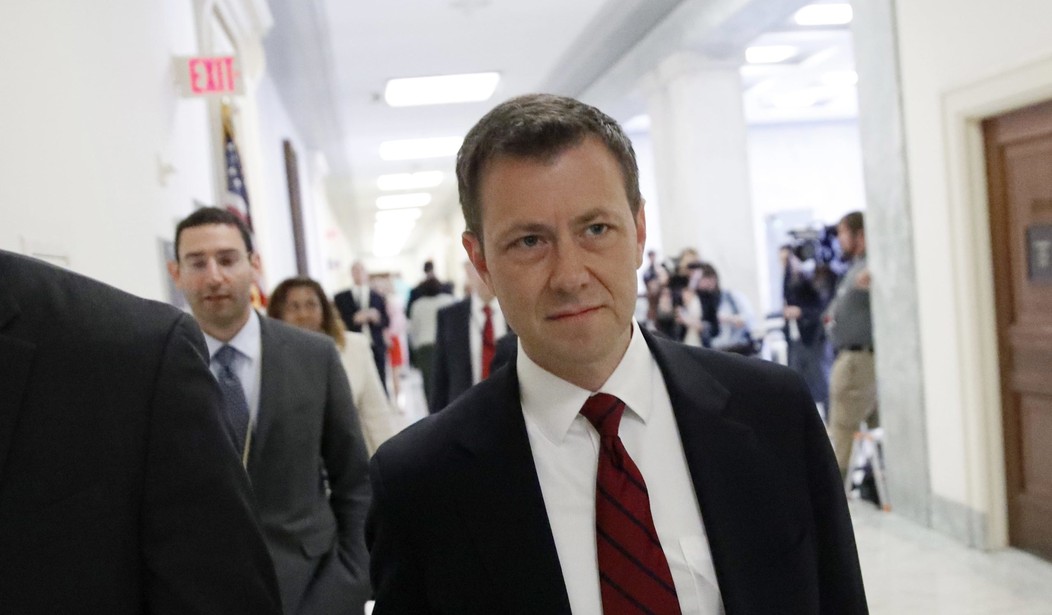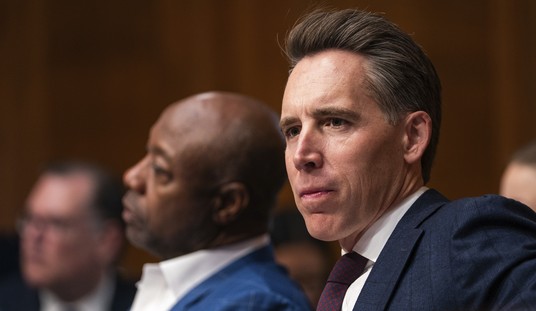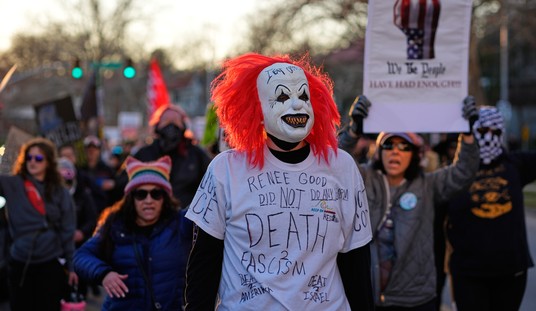A newly revealed text message suggests that fired FBI official Peter Strzok was ready to spring into action in January 2017 when CNN reported that President Trump had been briefed about allegations in the salacious and unverified Steele dossier.
Strzok, in fact, seemed downright eager to exploit the CNN report as a “pretext” to go “interview some people” as part of the FBI’s investigation into possible collusion between the Trump campaign and Russian government, according to the text message.
“Sitting with Bill watching CNN. A TON more out,” the excited former FBI counterintelligence official texted to his paramour, FBI lawyer Lisa Page, on January 10, 2017.
“Hey let me know when you can talk. We’re discussing whether, now that this is out, we use it as a pretext to go interview some people,” added Strzok, meaning the allegations in the dossier, which was authored by former British spy Christopher Steele and financed by Democrats.
Both former President Obama and President-elect Trump received classified briefings with intelligence chiefs that day on the unconfirmed claims made in the dossier.
The classified briefings were then conveniently leaked to the Washington media, allowing them to justify the publication of claims they had up to that point been unwilling to run. CNN first broke the news, and then the Washington Post and New York Times, satisfied with the cloak of credibility the CIA had given the Democratic opposition research, soon followed suit. Then BuzzFeed went ahead and published the entire unverified dirty dossier.
The Daily Caller’s Chuck Ross points out that former FBI Director James Comey wrote in a memo released in April 2018, that pressure from news outlets, “CNN in particular,” had convinced him to brief President-elect Donald Trump on the infamous dossier. “I said media like CNN had [the dossier] and were looking for a news hook,” Comey wrote in a memo just after briefing Trump about the dossier’s salacious allegations.
“I said it was inflammatory stuff that they would get killed for reporting straight up from the source reports,” he added.
On Jan. 8, 2017, FBI Deputy Director Andrew McCabe wrote to senior FBI leadership: “CNN is close to going forward with the sensitive story… The trigger for them [CNN] is they know the material was discussed in the brief and presented in an attachment.”
McCabe also emailed Deputy Attorney General Sally Yates and principal Deputy Attorney General Matthew Axelrod, saying, “Just an FYI, and as expected, it seems CNN is close to running a story about the sensitive reporting.”
As the FBI’s lead investigator on the probe into possible collusion between the Trump campaign and Russian government, Strzok would go on to conduct at least one interview of a Trump campaign official. He and another FBI agent interviewed National Security Advisor Michael Flynn at the White House on January 24, 2017. Weeks later, Flynn pleaded guilty to lying in that interview about his contacts with Russian Ambassador Sergey Kislyak.
The FBI may have used the dossier as a pretext to interview George Papadopoulos, another Trump associate who has pleaded guilty to the special counsel for lying to the FBI.
According to Papadopoulos’s attorneys, the FBI approached the former Trump aide at his mother’s home in Chicago on Jan. 27, 2017, claiming to be interested in discussing Sergei Millian, a Belarus-born businessman who had been identified just days earlier as a major source for the dossier.
“George thought the agents wanted to ask him about Russian businessman Sergei Millian. Wanting clarification, he asked the agents, ‘… just so I understand, I’m going there to answer questions about this person who I think you’re talking about,’” Papadopoulos’s lawyers wrote in an Aug. 31 court filing.
The lawyers said that the FBI agents “assured” Papadopoulos that Millian was the topic of the discussion.
Millian approached Papadopoulos out of the blue in late July 2016. The pair met multiple times during the campaign.
Papadopoulos’s lawyers said in the court filing that the FBI agents began asking Papadopoulos about Millian but quickly changed the subject to other topics.
“The agents asked how they first met, what they discussed, how often they talked or met in person, if George knew whether Mr. Millian was connected to Russia or a foreign intelligence service, and who else on Mr. Trump’s campaign may have been in contact with Mr. Millian. George answered their questions honestly,” the filing states.
But the lawyers claimed: “Less than twenty minutes into the interview, the agents dropped the Millian inquiry and turned to recent news about Russian influence in the presidential election.”
The lawyers asserted that one of the agents who interviewed Papadopoulos confirmed that the questions about Millian were “just a rule” to “get [Papadopoulos] in a room.
The agent reportedly said: “the reason we wanted to pull you in today and have that conversation [is] because we wanted to know to the extent of your knowledge being an insider inside that small group of people that were policy advisors who, if anybody, has that connection with Russia and what, what sort of connections there were.”
On Sept. 7, Papadopoulos was finally sentenced to a grand total of two weeks in jail for lying to investigators about the timing and scope of his contacts with Joseph Mifsud, a Maltese academic. Professor Mifsud allegedly told Papadopoulos that the Kremlin had “dirt” on the Democratic Party’s nominee, Hillary Clinton, in the form of “thousands” of “emails of Clinton.”
The mysterious Maltese professor, meanwhile, has been missing for months and is feared dead.
Before the election of Donald J. Trump, deep state operatives who were working to torpedo his candidacy seemed to be motivated by their hatred and distrust of the bombastic billionaire and probably believed they had the country’s best interests in mind. After the election, however, I am convinced these same operatives, as much as they loathed President Trump, were even more motivated by self-interest and fear that they would be held civilly and criminally liable for their corrupt actions. For almost 20 months, these operatives have fanned the flames of liberal discontent across the land in a sustained effort to get Trump impeached — if only to save themselves.








Join the conversation as a VIP Member